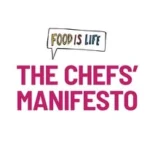Recipes for Change brings together two key actors within our food system- chefs and smallholder farmers- to tell the story of farming communities’ experience of climate change through a conversation around food. This initiative, created by the International Fund for Agricultural Development (IFAD), creates an engaging conversation centered on a key ingredient that showcases both the consequences of and strategies against climate change.
In each episode, a chef and farmer “bring to you a taste of someone else’s life” by telling the story of how a farming community’s livelihoods and food culture are vulnerable to climate change. Smallholder farmers discuss how their experience of climate change- as droughts, soil degradation or unpredictable weather patterns- have undermined traditional farming practices. The effects of this are two-fold. Changes in climate are putting farmers’ livelihoods at risk, as it’s increasingly difficult to grow and harvest in traditional ways. Secondly, crop failures are negatively effecting local food cultures, as key ingredients are disappearing from fields and thus traditional diets.
Fortunately, farmers are learning to adapt to these challenges and farm differently as to maintain their livelihoods. With the help of IFAD’s Adaptation for Smallholder Agriculture Programme, some smallholder farmers are learning to diversify crops yields or grow alternative, climate-resistant grains while others are engaging in new sources of income such as poultry rearing.
Chefs then have the opportunity to learn to cook and prepare a recipe with the farming community using the discussed traditional ingredients. This more than anything drives home the point that nothing unites us more than our universal need for food.
Here are two great episodes:
Fijian Chef Lance Seeto cooking Vai Ika- Tonga’s Tuna with Taro Leaves
Fijian Chef Lance Seeto visits farmer Launoa Mahe to learn how persistent droughts are threatening the Taro crop. As a key traditional crop and ingredient in northern Tonga, crop failures put at risk the job’s of Taro farmers and Tonga’s traditional recipes. Chef Lance learns to cook Tuna with Taro leaves, a common dish in Tonga and one that may disappear in the future. Positively, farmers in this community are learning to farm differently by diversifying crops and producing seedlings.
Chef Ali L’Artiste cooking Mwingi Town’s Muviko
Chef Ali L’Artiste learns about a grain increasingly grown in Kenya- sorghum (or mung bean). Not only important to Kenya’s cuisine historically, sorghum is also vital to the country’s future as a climate-resilient grain that requires little water to grow. Chef Ali learned from local smallholder farmers about the process of growing, processing and preparing this grain for cooking.
Chef involvement:
Here are three ways to get involved in this space:
1. Get to know your ingredients. Learn of the challenges local farmers experience due to climate change and the strategies implemented to improve their resilience.
2. Lead by example. Bring this knowledge into your own kitchens by sourcing and cooking climate-resilient or sustainable produce.
3. Spread the world. Promote the use of produce from local farmers and share your learnings on social media platforms.
To follow:
A full list of recipes from Recipes for Change.
Twitter: @IFAD






